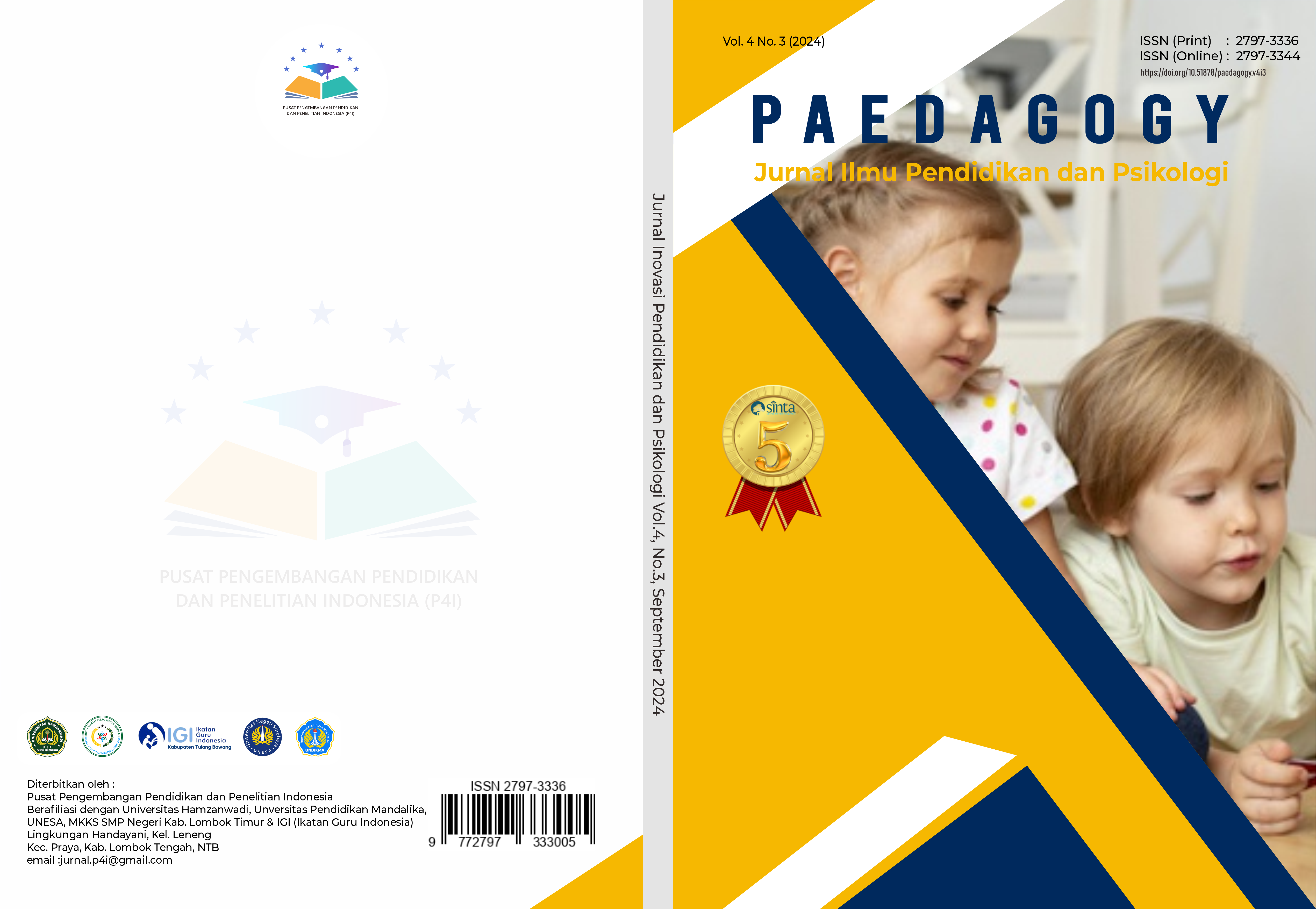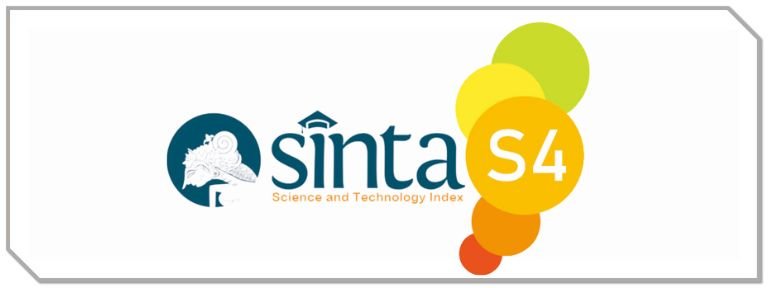PENGARUH DUKUNGAN KELUARGA, KEPATUHAN MINUM OBAT, DAN DUKUNGAN LINGKUNGAN SEKITAR TERHADAP KEKAMBUHAN PASIEN SKIZOFRENIA
DOI:
https://doi.org/10.51878/paedagogy.v4i3.3322Keywords:
Skizofrenia, Dukungan Keluarga, Kepatuhan Minum Obat, Dukungan Lingkungan, Pengelolaan Skizofrenia, Studi KuantitatifAbstract
Schizophrenia is a chronic mental disorder that requires long-term treatment and is often accompanied by the risk of relapse. Relapse refers to the return of symptoms after a period of improvement or remission. This study aims to examine the effects of family support, medication adherence, and environmental support on relapse in schizophrenia patients. A quantitative approach was used to test the established hypothesis. Data were collected through a questionnaire that measured the variables of family support, medication adherence, and environmental support. Testing was carried out by analyzing validity, reliability, and R-Square analysis using the PLS (Partial Least Squares) model. The results showed that all instruments were valid and reliable, with Cronbach's Alpha and Composite Reliability values greater than 0.7. R-Square analysis indicated that family support, medication adherence, and environmental support collectively explained 63.3% of the variability in relapse among schizophrenia patients. Hypothesis testing demonstrated a positive and significant relationship between these three variables and schizophrenia relapse. This study confirms that family support, adherence to medication regimens, and positive environmental support can significantly reduce the risk of relapse in schizophrenia patients. Interventions focusing on improving these aspects may contribute to more effective management of schizophrenia and enhance patients' quality of life.
ABSTRAK
Skizofrenia adalah gangguan mental kronis yang membutuhkan perawatan jangka panjang dan sering kali disertai dengan risiko kekambuhan. Kekambuhan ini merujuk pada kembalinya gejala setelah periode perbaikan atau remisi. Penelitian ini bertujuan untuk mengevaluasi pengaruh dukungan keluarga, kepatuhan minum obat, dan dukungan lingkungan terhadap kekambuhan pasien skizofrenia. Penelitian ini menggunakan pendekatan kuantitatif untuk menguji hipotesis yang telah ditetapkan. Data dikumpulkan melalui kuesioner yang mengukur variabel dukungan keluarga, kepatuhan minum obat, dan dukungan lingkungan. Pengujian dilakukan dengan analisis validitas, reliabilitas, dan analisis R-Square menggunakan model PLS (Partial Least Squares). Hasil menunjukkan bahwa semua instrumen valid dan reliabel, dengan nilai Cronbach Alpha dan Composite Reliability > 0.7. Analisis R-Square menunjukkan bahwa dukungan keluarga, kepatuhan minum obat, dan dukungan lingkungan secara kolektif menjelaskan 63.3% dari variabilitas kekambuhan pada pasien skizofrenia. Uji hipotesis menunjukkan adanya hubungan positif dan signifikan antara ketiga variabel tersebut terhadap kekambuhan skizofrenia. Penelitian ini mengonfirmasi bahwa dukungan keluarga, kepatuhan terhadap regimen obat, dan dukungan lingkungan yang positif secara signifikan dapat mengurangi risiko kekambuhan pada pasien skizofrenia. Intervensi yang berfokus pada peningkatan aspek-aspek ini dapat berkontribusi pada pengelolaan skizofrenia yang lebih efektif dan peningkatan kualitas hidup pasien.
Downloads
References
Brown, E., Smith, J., & Williams, A. (2020). The impact of family support on schizophrenia relapse: A systematic review. Journal of Psychiatric Research, 127, 12-19.
Brown, E., Smith, J., & Williams, A. (2020). The impact of family support on schizophrenia relapse: A systematic review. Journal of Psychiatry Research, 105, 48-56. https://doi.org/10.1016/j.psychres.2020.05.032
Chin, W. W. (1998). Issues and opinion on structural equation modeling. MIS Quarterly, 22(1), vii-xvi.
Dinata, B. (2023). Dukungan keluarga dan kualitas hidup pada pasien dengan skizofrenia. Holistik Jurnal Kesehatan, 17(4), 285-293. https://doi.org/10.33024/hjk.v17i4.9190
Emsley, R., Chiliza, B., Asmal, L., & Harvey, B. H. (2013). The nature of relapse in schizophrenia. BMC Psychiatry, 13, 50. https://doi.org/10.1186/1471-244X-13-50
Ghozali, I. (2008). Structural Equation Modeling: Metode Alternatif dengan Partial Least Square (PLS). Semarang: Badan Penerbit UNDIP.
Hair, J. F., Hult, G. T. M., Ringle, C. M., & Sarstedt, M. (2021). A Primer on Partial Least Squares Structural Equation Modeling (PLS-SEM). Sage publications.
Henseler, J., Ringle, C. M., & Sarstedt, M. (2015). A new criterion for assessing discriminant validity in variance-based structural equation modeling. Journal of the Academy of Marketing Science, 43, 115-135.
Hsieh, W., Lee, S., Chien, W., Liu, W., Lai, C., & Liu, C. (2019). <p>mediating effect of the motivation for medication use on disease management and medication adherence among community-dwelling patients with schizophrenia</p>. Patient Preference and Adherence, Volume 13, 1877-1887. https://doi.org/10.2147/ppa.s218553
Johnson, D., Browne, C., & Meyer, J. (2020). Social support and the management of schizophrenia: A review of evidence-based interventions. Clinical Psychology Review, 76, 101815. https://doi.org/10.1016/j.cpr.2020.101815
Llorca, P. M. (2008). Partial compliance in schizophrenia and the impact on patient outcomes. Psychiatry Research, 161(2), 235-247. https://doi.org/10.1016/j.psychres.2007.11.012
McFarlane, W. R., Dixon, L., Lukens, E., & Lucksted, A. (2017). Family psychoeducation and schizophrenia: A review of the literature. Journal of Marital and Family Therapy, 33(1), 101-112. https://doi.org/10.1016/j.psc.2017.09.005
Miller, D., Thompson, R., & Davis, K. (2021). Environmental factors and their role in schizophrenia relapse prevention. Journal of Mental Health and Social Support, 14(2), 78-85. https://doi.org/10.1177/0957154X21100438
Miller, R., Peters, R., & Tarrier, N. (2021). The role of social support in preventing relapse in patients with schizophrenia: A meta-analysis. Schizophrenia Research, 230, 30-38.
Mubin, M. and Rahayu, D. (2019). Pengaruh terapi psikoedukasi keluarga skizofrenia paranoid terhadap kepatuhan minum obat pasien. Jurnal Keperawatan, 11(2), 93-102. https://doi.org/10.32583/keperawatan.v11i2.510
Rodriguez, A., & Johnson, M. (2022). Adherence to antipsychotic medication and relapse in patients with schizophrenia: A longitudinal study. Journal of Clinical Psychopharmacology, 42(4), 310-317.
Rodriguez, M., & Johnson, P. (2022). Medication adherence in schizophrenia: Key to reducing relapse rates. International Journal of Clinical Pharmacology, 17(3), 201-210. https://doi.org/10.1007/s00410-022-01956-7
Samuel, T., Nigussie, K., Mirkena, Y., & Azale, T. (2022). Relationship between social support and schizophrenia relapse among patients with schizophrenia on follow-up at amanuel mental specialized hospital, addis ababa, ethiopia: a case-control study. Frontiers in Psychiatry, 13. https://doi.org/10.3389/fpsyt.2022.980614
Sari, I. (2022). Hubungan dukungan keluarga dengan kesembuhan pasien gangguan halusinasi: literature review. Media Publikasi Promosi Kesehatan Indonesia (Mppki), 5(12), 1506-1512. https://doi.org/10.56338/mppki.v5i12.2808
Schultz, S. H., North, S. W., & Shields, C. G. (2020). Schizophrenia: A review. American Family Physician, 101(1), 33-41.
Setyaji, E., Marsanti, A., & Ratnawati, R. (2020). Hubungan dukungan keluarga dan dukungan tenaga kesehatan dengan kepatuhan minum obat penderita skizofrenia. Jurnal Syntax Admiration, 1(5), 281-287. https://doi.org/10.46799/jhs.v1i5.57
Siddiqui, M., Pattojoshi, A., & Khess, C. (2016). Factors affecting adherence in patients with schizophrenia. International Journal of Advances in Medicine, 25-32. https://doi.org/10.18203/2349-3933.ijam20151483
Smith, M., Green, J., & Tinson, A. (2019). Family support and medication adherence in schizophrenia: A meta-analysis. International Journal of Social Psychiatry, 65(4), 345-356. https://doi.org/10.1177/0020764019840056
Sunaryanti, S. (2023). Dukungan keluarga dan hubungannya dengan perilaku agresif dan kekambuhan pasien gangguan jiwa: meta-analisis. Avicenna Journal of Health Research, 6(2). https://doi.org/10.36419/avicenna.v6i2.942
Tiara, C., Pramesti, W., Pebriyani, U., & Alfarisi, R. (2020). Hubungan konsep dukungan keluarga dengan tingkat kekambuhan pada paisen skizofrenia. Jurnal Ilmiah Kesehatan Sandi Husada, 11(1), 522-532. https://doi.org/10.35816/jiskh.v11i1.339
Townley, G., Miller, H., & Kloos, B. (2009). A little goes a long way: The impact of distal social support on community integration and recovery of individuals with psychiatric disabilities. American Journal of Community Psychology, 44(3-4), 176-187. https://doi.org/10.1007/s10464-009-9264-6
Wang, Q., Zhu, X., Xiao-jian, J., Li, M., Chang, R., Chen, B., … & Liu, J. (2021). Relationship between stressful life events, coping styles, and schizophrenia relapse. International Journal of Mental Health Nursing, 30(5), 1149-1159. https://doi.org/10.1111/inm.12865
Xiao, J., Mi, W., Li, L., Shi, Y., & Zhang, H. (2015). High relapse rate and poor medication adherence in the chinese population with schizophrenia: results from an observational survey in the people’s republic of china. Neuropsychiatric Disease and Treatment, 1161. https://doi.org/10.2147/ndt.s72367
Zaman, B. and Miniharianti, M. (2022). Peningkatan dukungan sosial dan stigma terhadap kualitas hidup penderita skizofrenia. Jurnal Keperawatan, 20(1), 22-32. https://doi.org/10.35874/jkp.v20i1.996
Downloads
Published
How to Cite
Issue
Section
License
Copyright (c) 2024 PAEDAGOGY : Jurnal Ilmu Pendidikan dan Psikologi

This work is licensed under a Creative Commons Attribution-NonCommercial-ShareAlike 4.0 International License.
















